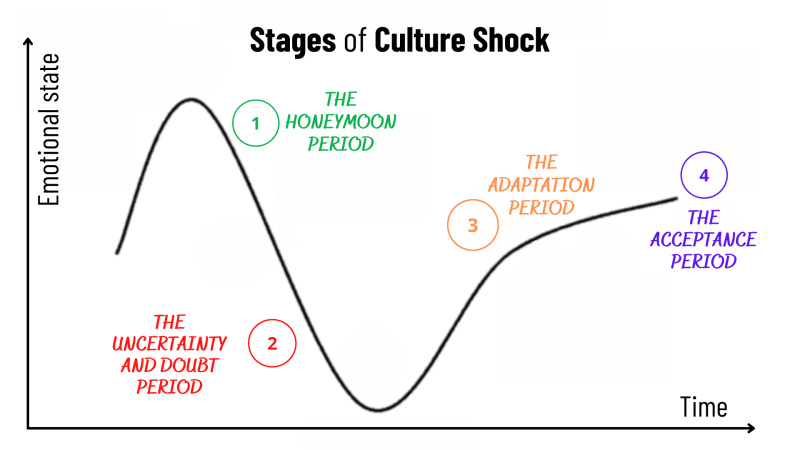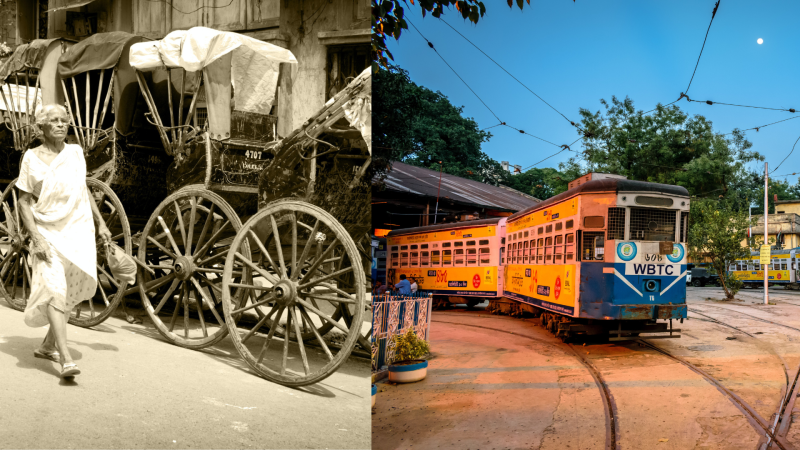First of all, let’s understand what culture is.
Culture can be defined as the set of norms, beliefs, behaviors, and values that people accept. It is a kind of knowledge that is possessed by a specific group of people and passed on from generation to generation [1]. The beauty of cultures is that they all differ from one another. For instance, when you meet someone, you may greet them by shaking their hand, touching their feet, pressing your arms together, or bowing down. Nevertheless, each of these gestures conveys the same message.
How do we perceive different cultures?
There are reasons to believe that our perception of daily life is largely shaped by our culture. Even simple processes in the brain can be influenced by culture [2]. Let’s take a look at the Müller-Lyer illusion (below). To many, the upper line might appear to be shorter than the bottom one. However, both lines are actually of equal length. This illusion is caused by the inverted angled lines – and scientists have attributed it to our lifestyles. One of the hypotheses they’ve developed is that people who grow up in large cities often fall for this illusion and conclude that one line is longer than the other. On the contrary, people from cultures who live in rounded huts and tents are more likely to perceive both lines as equal in length [3].
![Figure 1 - The Müller–Lyer Illusion [3]](/images/news/big/1289100.jpg)
Figure 1 - The Müller–Lyer Illusion [3]
So, what is culture shock?
It is a sense of disorientation that one feels when they encounter an unfamiliar culture or way of life. It can be caused by a number of reasons such as unfamiliar greetings and hand gestures, a language barrier, unfamiliar terrain or city layout, new food options, or faux pas that one causes as a result of being uninformed of a local custom. Irrespective of the situation, culture shocks can sometimes lead to anxiety, frustration, loneliness, and homesickness.

A graphic showing the stages of culture shock. Illustration by the author
Stages of culture shock
While the burden of culture shock might seem heavy, it can easily be dealt with by equipping yourself with the proper knowledge. Let’s first take a look at the different stages of culture shock. Anthropologists describe four stages, namely, honeymoon, frustration, adaptation, and acceptance.
-
The Honeymoon Period: This phase is overwhelmingly positive. It is when you fall in love with the new city, the language, the people, and everything around you. At this stage, the decision to relocate seems like the greatest decision of all time. Life is all but merry for the first few weeks while this stage lasts.
“It is even more beautiful than I had seen in photos. The buildings, the architecture, the vibe, it feels like a fable. The city is so clean, as well. The people are very kind and friendly,” said Daxta Pandey, a first-year Master’s student of business informatics.
-
The Frustration Period: This might be the most difficult stage of culture shock. Those who have spent a few weeks or months in the new country start getting tired of misunderstanding certain gestures, using translator apps to communicate, and surviving on pizza and pasta. Small incidents like losing a key, missing a bus, or having trouble ordering food might trigger frustration.
“I am a fish out of water here! I never lived in a dorm before. At home, I had a separate room to myself. That’s not at all the case here. I have to share my room with other students and that is not something that I like. I value privacy a lot and in a dorm, you hardly get that. I will need some more time to adjust and adapt,” said Usman Farooq, a Bachelor’s student of information security.
-
The Adaptation Period: After spending some more time in the new locale, frustration is subdued and you start feeling somewhat comfortable with the new place and the new culture. Navigating within the city becomes easier, friends and communities become more accessible, and the language also becomes more comprehensible. And if you are in Russia, the weather becomes less dreadful as well!
“When I arrived here, it was snowing! It was so cold that my nose started bleeding. The weather was very new to me. In Vietnam, it is usually very hot. However, my body started to adapt pretty fast. Now I am quite used to this weather,” said Chien Bui, a recent ITMO graduate.
-
The Acceptance Period: After months of wrestling with the above stages, the final stage is reached. Acceptance refers to a realization that a complete understanding of the new culture isn’t necessary to survive and thrive. What’s important is to strike a harmony between the new surroundings and one’s own cultural beliefs.
“Life as an international student has its advantages and disadvantages. At first, it was challenging, but now I am comfortable with my new life. I like meeting people from other cultures and learning about their countries,” said Damara Verdugo, a recent ITMO graduate.
There’s one more optional stage. It’s called re-entry shock.
Over the years, it has been observed that after spending an extended period of time in a foreign country, one might realize that things have drastically changed in their home country. It is no longer the same place where they used to live just a few years ago. Not only surroundings, but also beliefs and practices change over time.

Kolkata in the ‘90s and now. Credit: Alan (@18alan) and aceofnet (@aceofnet) via Unsplash
How to deal with culture shock
Culture shock is an unavoidable part of living abroad, so it is best to be well-informed and prepared in advance. Here are some ways in which you can get yourself ready:
-
Accept that it is normal: feeling alienated in a foreign land is perfectly normal. You are not alone. Accept it without hesitation!
-
Create your niche: make sure to carry a few objects that can make you feel at home, like a family picture or your favorite plushie.
-
Keep your mind open: be ready to learn new ways of living. Accept invitations to events, eat strange food (I tried squid for the first time when I was in St. Petersburg – Author), and hang out with locals.
-
Explore: don’t shy away from grabbing every opportunity that knocks on your door. Exploring the city on public transport is a great way to familiarize yourself with the new place. Pro tip – try getting a part-time job at the local KFC or cafe.
-
Find something that you love: whether it's painting or wandering aimlessly in a park, make sure to save some of your time to do what you love. It will massively help you to settle down quickly.
Remember, culture shock is an essential part of the experience of living overseas. Embrace it and you will never be bothered by it again.
References:
[1] Güss, C. D., Tuason, M. T., and Gerhard, C. 2010. Cross-national comparisons of complex problem-solving strategies in two microworlds. Cogn. Sci. 34:489–520. doi: 10.1111/j.1551-6709.2009.01087
[2] Güss C (2015) The Brain and Thinking Across Cultures. Front. Young Minds. 3:12. doi: 10.3389/frym.2015.00012
[3] Segall, M. H., Campbell, D. T., and Herskovits, M. J. 1966. The Influence of Culture on Visual Perception. Indianapolis, IN: The Bobbs-Merrill Company.




